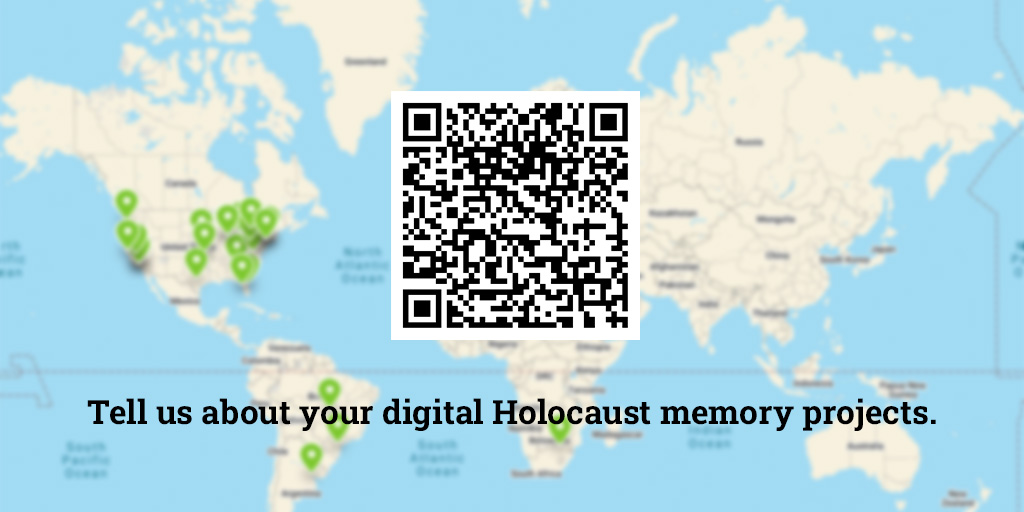
Surveying Global Digital Holocaust Memory Practice
By Victoria Grace Richardson-Walden
We’re investigating how Holocaust museums, memorial sites, libraries, and educational organisations use digital media in their work. Find out how you can get involved in this week’s blog.
Launched earlier this year, the digital Holocaust memory survey seeks to provide a comprehensive overview of digital practice and strategies across this global digital memoryscape.
What Do We Want to Know?
- What type of digital projects are being created and have historically been created across the professional Holocaust education and memory sector
- What social media channels are used and to what extent accounts of professional organisations are confronted with denial, distortion and misinformation
- How/ if AI and machine learning are being used in Holocaust education and memory organisations
- How digital engagement is managed internally, from a strategic through to an operational level.
Why?
One of our core goals is to build digital literacies and capacities across the sector, and this survey will help us to identify key areas where professionals working in Holocaust museums, memorial sites, libraries and educational organisations (or what we refer in shorthand to as the ‘Holocaust memory sector’) need support.
Our work is always informed by listening to rather the imposing findings on our stakeholders, collaborators and community; thus, the survey is one of many mechanisms we have introduced to allow organisations to tell us what is going on behind the scenes.
An additional advantage of the survey is the opportunity to identify projects we can add to our digital Holocaust memory map and the Digital Memory Database, and to initiate contact to plan future interviews and walkthroughs, so that we capture more experiences of those who have worked on digital projects in our field.
What Does It Ask?
The survey requires participants to complete a quick ethical verification, and some basic organisational identifiers: name and country.
Then it asks questions on the following themes:
- Types of digital projects available onsite at your organisation
- Types of digital projects available offsite/ online
- Social media channels
- Extent of Holocaust denial, distortion or other forms of hate faced on these channels, and whether this has worsened since October 7th 2023
- Protocols for dealing with this
- Use of AI or machine learning
- Any defunct digital projects your organisation has created previously
- Digital-focused staffing resource
- Digital capacity challenges
- Digital strategy
It ends by asking whether you are then willing to follow-up with interviews and walkthroughs for our wider research project.
How To Participate?
The survey will take about 20 minutes to complete, so please find a time when you can grab a hot drink and focus on this.
To complete it, you should be someone in your organisation who has oversight of these different areas, if not please do pass it onto a relevant colleague. We hope that by introducing the question themes in this blog that you’ll be able to collate any additional information, e.g., from your social media team, to help complete it.
Please complete the survey in one sitting – the survey software we use (Qualtrics) saves every response that is started, so if you complete the consent form but then don’t continue with the survey, then it saves the first response, and the team must manually delete it.
You can complete the survey here.
How Else You Can Help Us?
One you’ve completed the survey – if every contributor passed the survey onto five other contacts at other organisations this would help us reach teams that might not yet be on our radar. This so-called ‘snowballing’ effect is an efficient way to collect more results and will just a quick email or message to five people, you would be helping to grow this data set.
What Will We Do with the Results?
We will publish the survey findings as aggregated data – that means we will not name your organisation alongside the details you provide. Our publications then might say something like ‘30% of 250 surveyed Holocaust memory and education organisations do not have any digital provision onsite’.
Our publications may include, but are not limited to: blogs, presentations – in-person and recorded, academic articles, book chapters, monographs, other web content, social media posts.
We will use the data provided in the final ‘follow-up’ questions to contact you to proceed with interviews and walkthroughs.